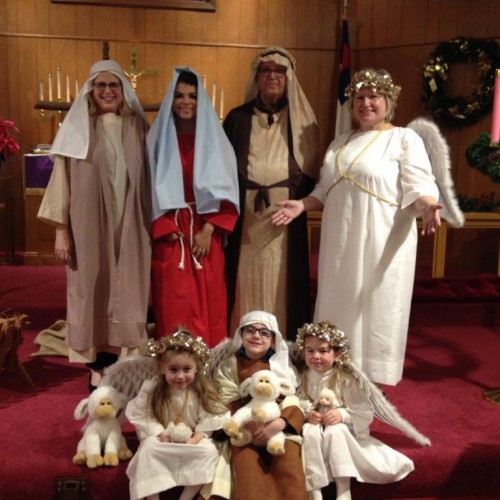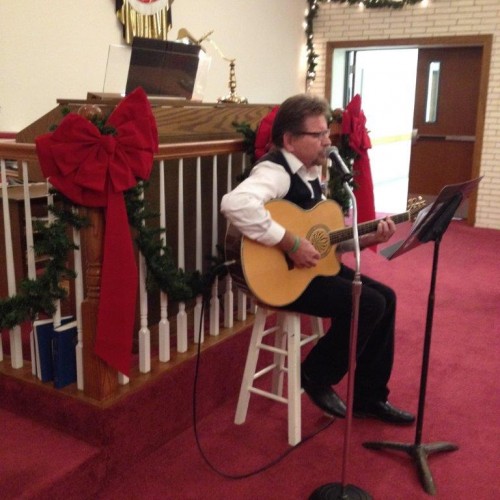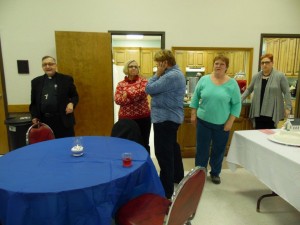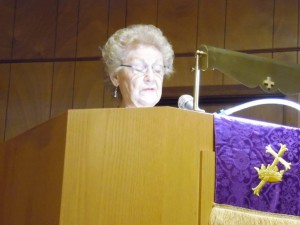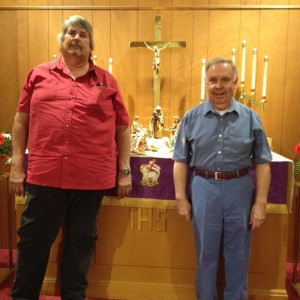Monthly Archives: December 2016
Sermon for December 25, 2016
Sermon for Christmas Day, December 25, 2016
St. Paul Lutheran Church, Wallis, Texas
Sermon Text: Luke 2:1-20
Sermon Theme: “The Gifts We Unwrap Today”
(Sources: Concordia Pulpit Resources, Volume 24, Part 1, Series A; Concordia Pulpit Resources, Volume 27, Part 1, Series A; Online jokes about Christmas gifts; original ideas and examples; Online sermon shelbyvillechurchofchrist, The Greatest Gift)
Grace, mercy and peace to you from God our Father and from the Lord Jesus Christ.
Last year, because my wife and I have difficulty getting up and down a ladder, a friend of ours put up hooks for our Christmas stockings. Because she loves our cat Gatsby so much, she included a hook for a burlap stocking she found in the tool shed that she thought was perfect for Gatsby. So this year, our cat has a stocking hanging this morning for gifts from Santa.
I just read something written by television host and comedian, Jimmy Kimmel. He said that every year Americans spend millions of dollars on Christmas gifts for their pets, which makes no sense to him. Your pet doesn’t know it’s Christmas. In fact, your pet doesn’t even know he is a pet, so giving your cat a sweater is about as useful as giving your microwave a hat. I think he’s got a point there. Gatsby hasn’t even noticed he has a stocking.
But the rest of us know that we have a stocking, and we know how many gifts we bought this Christmas, and we wonder whether the recipients will like them or not. One of my greatest anxieties at Christmas is what if my wife or my daughters or my granddaughters don’t like the gifts I got them. They might not say anything, but you can see on their faces and in their eyes that they didn’t like what you gave them and were disappointed. But is that what Christmas is really all about? If so, then it’s a miserable festival.
It is about gift-giving, however, but not the kinds of gifts that make people greedy and avaricious.
I want to talk about two gifts this morning. One is MY gift to you. And the other is GOD’S gift to all of us. Continue reading
Sermon for December 18. 2016
Sermon for the Fourth Sunday in Advent
December 18, 2016, St. Paul Lutheran Church, Wallis, Texas
Sermon Text: Matthew 1:18-25
Sermon Theme: “What the Angel Told Joseph in His Dream”
(Sources: Concordia Pulpit Resources, Vol. 17, Part 1, 11-27-16-2-26-17, Series A; Anderson’s Cycle A Preaching Workbook; original ideas and examples; Online Jokes about Dreams; Emphasis Online Commentaries; Emphasis Online Illustrations; Harper’s Bible Dictionary)
Grace, mercy and peace to you from God our Father and from the Lord Jesus Christ.
A daughter tells the story about her parents who were asleep in bed one night, when her dad woke up everyone in the house with a loud, exuberant shout of “HELLO,” obviously to someone in his dream. His booming “hello” scared his wife half to death so that she almost fell out of bed.
So, the next night, as the family was getting ready for bed, the Mama said to the Daddy, “Honey, if you see somebody you know tonight, just wave, — OK?”
Psychologists have written books about the meaning and significance of dreams. Both the Old Testament and the New Testament make it clear that dreams are very important, — such as Pilate’s wife having a disturbing dream about the innocence of Jesus, the Wise Men being warned in a dream not to return to Herod, and, in today’s sermon text, an angel speaking to Joseph in a dream about Mary’s pregnancy.
While some dreams are funny, this is the most serious dream in the history of humanity, because it’s about the miraculous birth of the Savior of the world. Joseph is a good man, humble and lowly, not rich, and God chooses him to be the foster father of God’s only begotten Son. Because we see little and hear nothing of Joseph in the New Testament, I chose to focus on him for this past Wednesday night’s Advent Service.
As I said Wednesday night, Joseph was a very devout Jew who observed Hebrew laws and traditions, he was kindly and chivalrous, he was a loving and faithful husband, a good father, and he was hard-working and dependable. No doubt those are reasons God chose him for the role he played in God’s plan for Salvation.
In this miraculous dream, the Angel of the Lord says to Joseph, “Joseph, son of David, do not fear to take Mary as your wife, for that which is conceived in her is from the Holy Spirit. She will bear a son, and you shall call His name Jesus, for He will save His people from their sins.” Joseph has been going through some soul searching doubt when this message from the Angel comes in a dream. The woman he is engaged to is found to be with child, and Joseph was thinking of divorcing her quietly. Joseph stands at a major crossroad in his life. Continue reading
December 4th – St. Paul Historical Marker Dedication
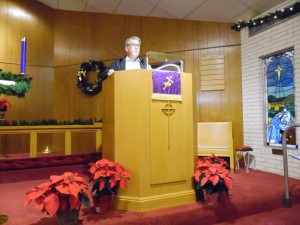
Jan Johnson, Congregational President, as Master of Ceremonies introducing the speakers for St. Paul’s Historical Marker Program on Dec. 4.
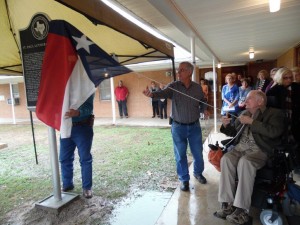
Robert Osborne is shown unveiling the St. Paul Historical Marker at the site after the Dedication Program.
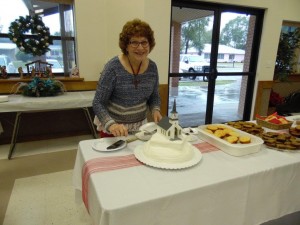
Peggy Spitzenberger getting ready to cut the special Marker Dedication celebration cake during the brunch held after the program. A replica of the old church built in 1901 rests on top of the cake.
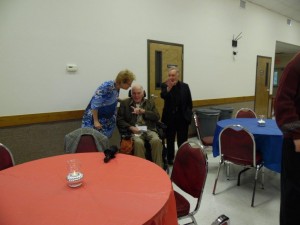
Cheryl Davis, Chairperson of the Maker Dedication Committee, shown speaking with Robert Osborne and Rev. Scott Stallings after the unveiling.
Sermon for December 04, 2016
Sermon for the Second Sunday in Advent
December 4, 2016, St. Paul Lutheran Church, Wallis, Texas
Sermon Text: Isaiah 11:1-10
Sermon Theme: “Old School Lutherans and the Root of Jesse”
(Sources: Emphasis Online Commentaries; Emphasis Online Illustrations; original ideas and examples; “You Know You Are a Lutheran If . . .”; “Es Ist Ein Ros Entsprungen”; Anderson’s Cycle A Preaching Workbook; Wikipedia)
Grace, mercy and peace to you from God our Father and from the Lord Jesus Christ.
One of the many reasons I loved coming here to serve this congregation in 1988 was the fact that my home congregation, Trinity Lutheran Church, Dime Box, reminded me so much of this church. The parallels astonish me.
Like St. Paul’s, whose historical recognition we celebrate today, my home church was also established in 1900. You know, thousands of German Lutherans came to America, many of them to Texas, in the mid to late 1800’s, so by 1900, there were many immigrant churches being founded in Texas, — a blessing to those who probably spoke some English by then, but were not proficient enough in English to easily understand a sermon preached in English or the Bible read in English, or the hymns sung in English.
One of the older members of this church, Anita Mayer, now deceased, told me when I first came on board as pastor here that even though her parents were quite proficient in English, they were opposed to switching from German to English. And even though she herself could read and speak English much better than German, her father insisted that she learn Luther’s Small Catechism in German, and that the pastor confirm her in German. The pastor went along with her father’s wishes, a fact that made the Confirmation class about three times as hard for her. She said she was glad when this church finally did change to English.
Trinity, Dime Box, and St. Paul, Wallis, held German services from 1900 until about the time of World War II, so I grew up hearing all the old Lutheran hymns in German. That old German hymnal was so small you almost had to have a magnifying glass to read it, but it didn’t matter, because by the time your eyesight got bad enough due to old age, you knew all the old hymns by memory anyway. You know you’re an “old-school Lutheran” if you LOVE to sing, but ONLY if they’re the hymns you learned as a child.
We are generally considered “old school” Lutherans if we grew up with the German language used in the worship service. There is a lot about us old school Lutherans that’s kind of quaint and lovable, but we’re also a tad obnoxious at times. Old school Lutherans still make and serve Jello at covered dish dinners in the liturgical color of the altar paraments for that Sunday. Old-school Lutherans fervently believe you have to serve Spam-salad sandwiches at all wedding receptions.
Because they don’t believe anyone should be proud or conceited or a show off in any way, old-school Lutherans always put the organ in the back of the church, they have the choir and the soloists sing from the back of the church, and the pastor prays with his back to the congregation.
Old-school Lutherans hear the pastor tell a joke during his sermon and they SMILE as loud as they can. Continue reading

